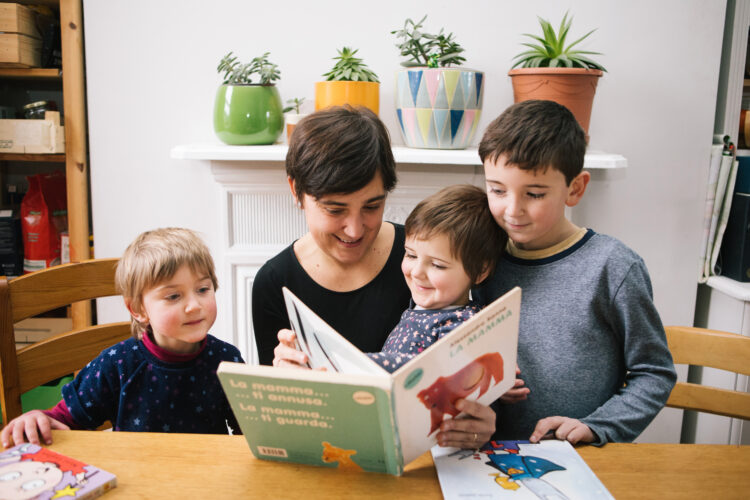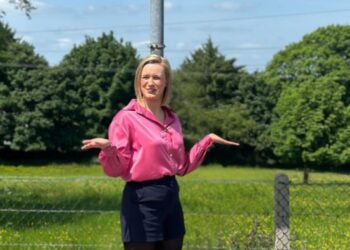More and more families in Ireland are trying to raise bilingual children, but it is challenging as English is so dominant. Mother Tongues is here to help.
We tend to assume that if a family has a connection in another country, that they must surely speak the language and have bilingual children. Why wouldn’t they — it’s such a great skill to have and it must be so easy having it in the family? But it is not quite so simple. Raising multilingual children takes a huge investment of time and effort, and for families in Ireland, a country where English is so dominant, it can be tempting to let that language go.
Meet the expert
Francesca La Morgia is Italian and works as an assistant professor in Clinical Speech and Language Studies in Trinity. She has studied bilingual children throughout her career and raises her three children bilingual. In 2017 she set up Mother Tongues, a not for profit organisation that runs workshops and networking events for bilingual families as well as in schools and businesses all over Ireland. It aims to support parents as they try to keep their children connected to their heritage. She believes that building communities is key for raising bilingual children in Ireland.

Francesca and her three children
“People need a community. Parents do in order to keep their languages and if you want your child to speak your language you cannot be the only person in that child’s life speaking that language,” Francesca explains. “When your kids see other people using the language, when they can play with other children in that language and see it spoken outside of the home, it shows them that it is useful. But in Ireland we found that a lot of families don’t have a cohesive community. You could have a speaker of Basque or Latvian who finds it difficult to find other speakers in their community, and that is probably even truer outside of Dublin. In the city there might be a group or an embassy organising activities but if you are outside of Dublin it can be so hard to find someone else who speaks your language.”
Learning together
Mother Tongues runs storytelling sessions in libraries, as well as meet-ups for families. It also offers classes which are really effective. “In one class we give them enough information that they usually don’t need to come back, maybe sometimes just for a refresher. We can see people take the practical advice and they can go home and apply it and feel happier about it. We are running this organisation in our own free time but there is such a joy of making a difference.”
These parents need to be supported and encouraged, as they can feel very alone in their goal. “Very often parents know exactly what to do and they just want reassurance. Through Mother Tongues, they talk to us for expert advice, and get talk to other parents who are going through the same thing, and it inspires them. They say maybe this week I will read more stories in my language and put aside the English books, or I’ll think of a strategy, like reading Swedish stories only at bedtime so that a special time is reserved for Swedish. Every family’s situation is different, so it’s about making it work for you,” Francesca says. “We have given talks in direct provision centres one week and in Google the next. These people are all parents and they all have the same genuine concerns for their child and their development.”
Benefits for children
Having bilingual children not only gives them the chance to connect with their heritage, it also ensures the children can have meaningful relationships with their extended family. “It may seem obvious, but you would be surprised at how many children cannot speak to their grandparents. They might go to the country and the grandparents are learning English to speak to the children and it is a very impoverished conversation,” Francesca says. “It will also help children in their education. When you are tuned into more than one language from a young age, you better understand how languages work. That makes it easier to learn additional languages. It is advantageous for literacy, so the kids are very aware of how phonics, spelling and sounds work, so they get it that bit faster.”
Tips for parents
So how do parents make this work? Very often bilingualism comes easily until the child starts school and realises that they can use English more often. Evan Furlong is originally from Taiwan and she lives in Bray with her Irish husband and their two children. She has always spoken Mandarin to her children, but when they started school she saw their English thriving. “Their vocabulary in English increased dramatically, while speaking about daily things at home their vocabulary in Chinese didn’t increase, so the English overtook the Chinese. They started to find that they could communicate better in English,” Evan says.
This is very common, Francesca explains, as kids will naturally be drawn to what makes life easier for them, and navigating school and friendships in Ireland is certainly more straightforward in English. “As they get older, they use the language they know best. You are drawn to what is easier. That is why you hear parents say ‘even though I speak Polish to my child they respond in English’. They understand you perfectly, they know how to respond, but they know that you will understand them in English and it is easier for them to speak English so that is what they will go with. My children know I understand English, so it’s difficult to tell them to only speak Italian to me,” Francesca explains.
“The children need encouragement. So you need to tell them that you like it when they speak their language, and to give them as many opportunities as possible within the house and beyond to use the language.”
Making it work for your family
Evan made the decision to only speak to her children in Mandarin, even when her Irish in-laws were around. “They expected me to speak English with the children in front of them but I actually refused to do that. I explained to them that I wanted to keep that reflex of using Chinese with me. I agreed that if it concerned them I would translate. It was a challenge. But I have a feeling of accomplishment now that they are 12 and 14 and still bilingual.”
Having a bilingual home also empowers parents to retain that part of their identity. Paola is Italian and lives in Galway with her family. She has found her own command of Italian has lagged as she speaks more English. So she can see how important it is to keep the language alive with her own kids.
“The main problem is I have been living here for 20 years. I am a linguist, I love English, my husband is Irish, and so I slip into English without thinking. I don’t even think in Italian anymore,” Paola says. “But I want them to speak the language, a second language is so important. I first learned English in secondary school. I remember how much effort I had to put in to become proficient. Growing up with a gift of any second language for free I felt it would help them in whatever path they take. You get more flexibility in your mind and can see things from a different perspective.”
Celebrating all cultures
Francesca also runs the Mother Tongues festival in Galway in February and in Dublin in March. There are performances and workshops in over 20 languages, and all are welcome. It’s a lovely celebration of everyone who is raising bilingual children in Ireland, no matter what the language. Evan will run Chinese calligraphy and hand puppet workshops in Mandarin and English. “Almost 200 languages are spoken in Ireland. The festival shows people that their languages are valued,” Francesca says. “It’s very rare in Ireland that you can attend something in your native language. Parents need to be encouraged to use their language just like children. Seeing the community placing a value on it will help individuals value their language more too.”
Mothertongues.ie | Words: Róisín Healy | Photography: Rita Slattery
This article originally appeared in the March 2019 issue of Irish Country Magazine.








